What Are the Twelve Tribes of Israel?
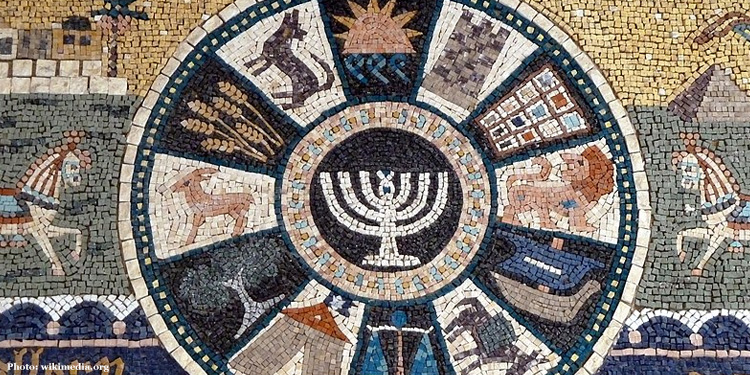
The 12 Tribes of Israel were named after the sons and grandsons of Jacob. Jacob, named “Israel” by God (Genesis 32:28; 35:10), had 12 children with his two wives, Leah and Rachel, and his concubines, Zilpah and Bilhah. The names of Jacob’s sons were Reuben, Simeon, Judah, Dan, Naphtali, Gad, Asher, Issachar, Zebulun, Joseph, Benjamin, and Levi. The tribes are named after ten of Jacob’s sons, all except for Joseph and Levi. Joseph’s two sons, Ephraim and Manasseh, are named as the final two tribes. Levi is not named as one of the 12 Tribes of Israel; however, Levi is the Tribe of the Chosen, set apart from the others as God’s Tribe.
The Names of the 12 Tribes
- Reuben
- Simeon
- Judah
- Dan
- Naphtali
- Gad
- Asher
- Issachar
- Zebulun
- Ephraim
- Manasseh
- Benjamin
Nearing the end of his life, Jacob named each tribe after ten of his sons and two of his grandsons: Reuben, Simeon, Judah, Dan, Naphtali, Gad, Asher, Issachar, Zebulun, Ephraim, Manasseh, and Benjamin. From his deathbed, Jacob went into detail about each tribe, sharing his blessings and prophecies for their descendants: “All these are the twelve tribes of Israel, and this is what their father said to them when he blessed them, giving each the blessing appropriate to him” (Genesis 49:28).
Reuben
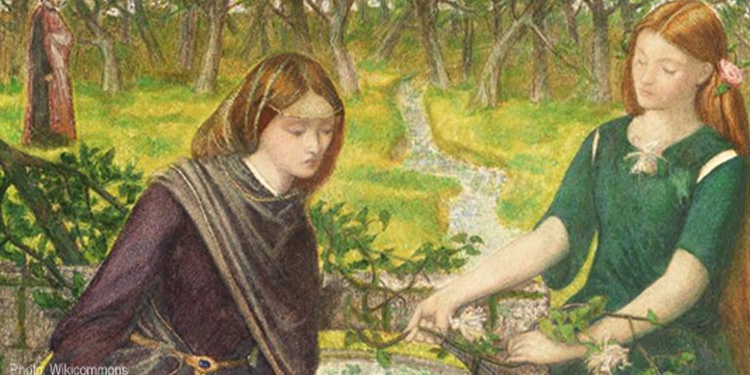
Reuben was the firstborn son of Jacob. The Hebrew name Reuben translates to “Behold a son!” The birth of Reuben was exciting for his mother Leah, who felt that Jacob loved Rachel more than her (Genesis 29:16-17). Leah believed that this child would make Jacob love her as much as he loved her sister (v. 32). The symbol used for the tribe of Reuben, described by Jacob as “my firstborn, my might, the first sign of my strength” (Genesis 49:3), is either a rising sun or a blossoming plant.
As the tribe of Reuben settled east of the Jordan River, their choice of land reflected their pastoral lifestyle, rich in livestock and requiring expansive grazing fields. This geographical separation, however, also meant that they were often the first line of defense against eastern invaders, a role that demanded bravery and resilience. Over time, the Reubenites developed a reputation for their warrior spirit, as seen in their valiant participation in various battles to defend and secure the land for Israel.
Despite the early setback in their patriarch’s life, the tribe of Reuben carved out a distinct identity, balancing their pastoral roots with the responsibilities of guardianship on the fringes of the Israelite territory.
Simeon
In Hebrew, the name Simeon means “to be heard.” One of the notable Bible stories about Simeon is found in Genesis 34. After his sister Dinah was defiled, Simeon and his brother attacked and killed the men of an entire city to avenge her. The symbols of his tribe are a gate and a sword. The sword is used because Simeon used a sword when he slaughtered the men of Shechem. The gate is also used because it symbolizes the gate located on the road between Shechem and Jerusalem.
The tribe of Simeon, carrying the legacy of their forefather’s fierce protectiveness and assertive nature, had a complex history among the tribes of Israel. Their land allotment, as described in the Book of Joshua, was situated within the territory of Judah. This unique arrangement, where one tribe’s land is enveloped by another’s, symbolized the intertwined fate of Simeon with its more powerful neighbor. Over time, the Simeonites seemed to have assimilated to some extent with the Judahites, sharing not just land but also cultural and social practices.
Despite this integration, the tribe of Simeon maintained its distinct identity, as reflected in its participation in various key events in Israelite history. For instance, during the period of the Judges, the tribe of Simeon joined forces with Judah in a military campaign against the Canaanites, showcasing their continued warrior ethos. The gate symbol, apart from its geographical significance, also came to represent the tribe’s role as a guardian within the Israelite community, standing at the crossroads of important trade and military routes. The story of Simeon, thus, is one of adaptation and alliance, as they navigated their place within the larger narrative of the Israelite tribes.
Judah
The tribe of Judah was the first territory established in the land of Israel, and it occupied the southern part of the Holy Land. After settling south of Jerusalem, Judah quickly became one of the most powerful tribes in Israel. Known as the Tribe of Kings, Judah has many notable biblical descendants, including King David, King Solomon, and Caleb, as well as Mary and Jesus in the Christian Bible. In Hebrew, Judah (Yehuda) means “praise” and is often symbolized as a lion.
The lion symbol for the tribe of Judah, often depicted as the Lion of Judah, is deeply emblematic, representing strength, leadership, and royal dignity. This imagery is rooted in Jacob’s blessing to Judah in Genesis, where he is likened to a lion, the king of beasts, foretelling the tribe’s preeminent position in Israel. The tribe’s territory, including the fertile hills and valleys around Jerusalem, became a political and spiritual center for the Israelites, further cementing Judah’s central role in the narrative of the Jewish people.
Judah’s influence extended beyond its military and political might. The tribe played an important role in the cultural and religious life of Israel. It was from Judah that much of the Hebrew Bible’s literature emerged, including the Psalms, many of which are attributed to King David. The tribe’s legacy continued through the Babylonian Exile and the return to Jerusalem, where they led the rebuilding of the Temple.
Dan
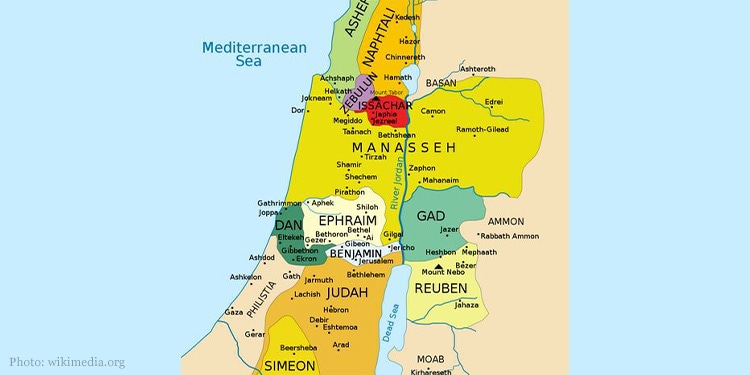
The fifth son of Jacob, Dan’s name translates to “God is my judge” in Hebrew, as the Tribe of Dan was known for its judges and laws. In fact, one of the most prominent judges of Israel, Samson, descended from the Tribe of Dan. The tribe is often symbolized as the scales of justice or as a snake, the latter the result of Jacob’s blessing for his fifth son: “Dan shall be a serpent in the way, a viper by the path, that bites the horse’s heels so that his rider falls backward” (Genesis 49:17).
Their territory, initially allocated in the southwestern part of the land near the Mediterranean coast, was known for its fertile land and strategic location. However, the Danites faced challenges in fully securing their territory, leading to notable migrations and expansions, as depicted in the biblical narrative of the conquest of Laish, which they renamed Dan (Judges 18). This northern city became a significant cultural and religious center for the tribe.
The symbol of the snake, derived from Jacob’s blessing, is often interpreted as a representation of the tribe’s character – shrewd, adaptable, and resilient. These traits were embodied in their most famous judge, Samson, a figure of immense strength and complex character, whose story is one of triumph and tragedy. Samson’s narrative, filled with feats of strength and moments of vulnerability, reflects the broader story of the Tribe of Dan – a story of struggle, adaptation, and enduring identity amidst the shifting landscapes of Israelite history.
Naphtali
Both Naphtali and Dan shared Jacob and Rachel’s maidservant Bilhah as their birth mother. Jacob’s sixth son was born when Rachel and Leah were still competing with each other for his love. As a result, Rachel named Bilhah’s second son Naphtali, which means “I have prevailed” or “to win through wrestling” in Hebrew. Jacob blesses Naphtali with words of beauty, saying he is “a doe let loose” (Genesis 49:21), thus the Tribe of Naphtali is symbolized by a gazelle running.
The Tribe of Naphtali occupied a region in the northern part of Israel, known for its natural beauty and fertile lands. This territory, including the western shores of the Sea of Galilee and stretching towards the Lebanon mountains, was well-suited for agriculture and trade. The tribe’s location made them a crucial link between Israel and the northern kingdoms, playing a significant role in regional interactions.
The Naphtalites were known for their prowess in battle, as evidenced in their significant contribution to the famous victory led by the prophetess and judge Deborah and the military leader Barak against the Canaanite king Jabin, as recounted in the Book of Judges.
Gad
Settled into territory east of the Jordan River, the Bible describes the Tribe of Gad as “brave warriors, ready for battle and able to handle the shield and spear” (1 Chronicles 12:8). The name Gad means “warrior” in Hebrew, and this tribe is symbolized by a military tent, for those who protected the borders of Israel, traced back to Jacob’s blessing for his seventh son: “Raiders shall raid Gad, but he shall raid at their heels” (Genesis 49:19).
Renowned for their martial prowess and strategic acumen, they played a vital role in the defense and security of Israel. Their settlement east of the Jordan River, a region known for its rough terrain and vulnerability to external threats, necessitated a warrior-like disposition. The Gadites, living in these borderlands, developed into formidable warriors, adept in the arts of war and known for their bravery and skill.
The symbol of the military tent is particularly apt for the Tribe of Gad, reflecting their constant state of readiness and their role as guardians of Israel’s eastern frontier. This symbol also signifies the tribe’s nomadic origins and their adaptability to the harsh conditions of their territory. The blessing given to Gad by Jacob, which speaks of raiders and counter-raids, encapsulates the tribe’s experience of frequent conflicts and their resilience in the face of adversity.
In addition to their military contributions, the Tribe of Gad also played a significant role in the social and religious life of Israel. They were among the tribes that faithfully joined King David, as mentioned in 1 Chronicles, bringing their renowned fighting skills to support his reign. The Gadites’ commitment to the collective security and prosperity of Israel, despite their remote location, underscores their integral place within the broader narrative of the Israelite tribes.
Asher
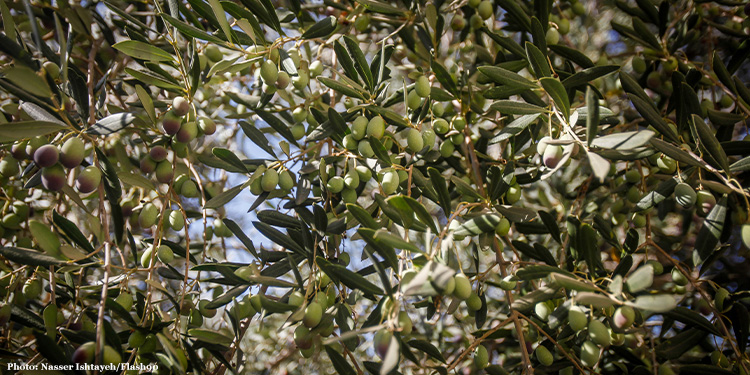
Genesis tells us of the birth of Jacob’s eighth son, whose name means “happy” and “blessed” in Hebrew: “Then Leah said, ‘How happy I am! The women will call me happy.’ So she named him Asher” (30:13). Jacob blesses Asher, telling him that his “food will be rich; he will provide delicacies fit for a king” (Genesis 49:20). An olive tree is the symbol for the Tribe of Asher, assigned by Joshua to territory near Galilee known for its fertile land and olive trees.
The Tribe of Asher, symbolized by the olive tree, a sign of peace and prosperity, was blessed with one of the most fertile regions in ancient Israel. Their territory, located in the western part of the Galilee, was known for its lush landscapes and, notably, its abundant olive groves. This bountiful land not only provided the tribe with a rich source of food and economic stability but also played a significant role in their cultural and religious identity.
The olive tree, a vital crop in the ancient world, was central to the tribe’s economy and daily life. Olive oil was a valuable commodity, used for cooking, lighting, and anointing in religious ceremonies.
Issachar
The Tribe of Issachar is symbolized by a donkey, after Jacob’s biblical blessing: “Issachar is a rawboned donkey, lying down among the sheep pens. When he sees how good is his resting place and how pleasant is his land, he will bend his shoulder to the burden and submit to forced labor” (Genesis 49:15-15). Known for their wisdom and foresight during the reign of David, tribesmen from Issachar are described in the Bible as “men who understood the times and knew what Israel should do” (1 Chronicles 12:32).
This tribe’s territory, located in the fertile Jezreel Valley, was ideal for agriculture, providing them with the resources to pursue both scholarly and agricultural endeavors. The symbol of the donkey, often associated with labor and perseverance, aptly reflects Issachar’s willingness to work hard and bear the burdens necessary for the prosperity of their land and people.
Furthermore, the Tribe of Issachar is often credited with a deep commitment to the study of Torah and Jewish law, contributing to the spiritual and religious scholarship of Israel. Their dedication to both intellectual pursuits and the cultivation of their land exemplifies a balanced approach to life, combining practical skills with wisdom and insight. The legacy of Issachar, therefore, is one of intellectual depth, practical wisdom, and a steadfast commitment to the well-being and prosperity of their community and the broader nation of Israel.
Zebulun
Zebulun, another son of Leah, was born after Issachar. Derived from the word “zabal” in Hebrew, his name means “to dwell” and is symbolic of Leah’s hope that a new son would find Jacob dwelling with her instead of her sister Rachel. The most common symbol for the Tribe of Zebulun is a ship, after Jacob’s blessing that says this son “will live by the seashore and become a haven for ships” (Genesis 49:13).
Although their allotted territory in the land of Israel did not directly border the sea, it was close enough to the Mediterranean coast to facilitate seafaring and trade. This strategic location enabled the Zebulunites to develop a thriving commercial culture, becoming a vital link in trade routes that connected inland regions with the wider Mediterranean world.
Jacob’s blessing, foreseeing Zebulun’s future as a haven for ships, highlights the tribe’s role in expanding Israel’s economic and cultural horizons. The symbol of the ship not only represents their maritime activities but also signifies the tribe’s spirit of exploration, adaptability, and openness to new ideas and cultures brought by trade and interaction with foreign lands.
Moreover, the Tribe of Zebulun is often associated with a partnership with the neighboring Tribe of Issachar. While Zebulun was engaged in commerce and trade, Issachar was devoted to study and religious scholarship. This partnership is celebrated in Jewish tradition as an exemplary model of collaboration, where the material success of Zebulun supported the scholarly pursuits of Issachar, and in return, Issachar provided spiritual and intellectual guidance to Zebulun.
Manasseh and Ephraim
Both Ephraim and Manasseh are the sons of Joseph and the grandsons of Jacob. Ephraim and Manasseh are often called the “two half-tribes of Joseph” since Joseph is not listed as one of the tribes. The name Manasseh, Joseph’s first son, means “one who forgets.” While this may sound negative, Joseph named his son Manasseh “because God has made me forget all my trouble and all my father’s household” (Genesis 41:51).

In his blessing of the two sons of Joseph, Jacob “put Ephraim ahead of Manasseh” (Genesis 48:20). The name Ephraim means “fruitful, fertile, and productive,” which Joseph chose “because God has made me fruitful in the land of my suffering” (Genesis 41:52).
Manasseh, whose name signifies overcoming hardship and moving forward, was given a large and fertile territory that spanned both sides of the Jordan River. This expansive land allocation indicates the tribe’s importance and potential for growth and prosperity. The tribe of Manasseh played a crucial role in the settlement and defense of these regions, contributing to the overall development and security of Israel.
Ephraim, named for fruitfulness and productivity, was also granted a fertile region in the heart of the land of Israel. The tribe of Ephraim quickly rose to prominence, becoming one of the most influential tribes in the Israelite confederation. Ephraim’s central location, coupled with its agricultural prosperity, positioned it as a leader among the tribes. This leadership was further solidified by the tribe’s notable figures, such as Joshua, who led the Israelites into the Promised Land and became one of their most revered leaders.
Jacob’s decision to put Ephraim ahead of Manasseh in his blessing was prophetic, as Ephraim indeed grew to be more prominent in political and military affairs. However, both tribes were integral to the Israelite nation, each contributing in their unique ways to its development and identity.
Benjamin
In Hebrew, the name Benjamin translates to “son of my right hand.” In his biblical blessing, Jacob called his youngest son “a ravenous wolf; in the morning he devours the prey, in the evening he divides the plunder” (Genesis 49:27), so a ravenous wolf is the symbol of the Tribe of Benjamin. King Saul and Mordecai were a couple of the most famous tribesmen from this tribe also known for standing against all of Israel during the civil war (Judges 20:14-21:24).
Despite being one of the smallest tribes, Benjamin’s warriors were renowned for their skill and courage in battle. The tribe’s most famous figure, King Saul, the first king of Israel, further exemplifies the tribe’s notable contribution to Israelite leadership. Saul’s reign, marked by both military victories and personal challenges, reflects the tribe’s complex character – bold and assertive, yet also facing significant trials. Additionally, the story of Mordecai, a key figure in the Book of Esther, highlights the tribe’s continued influence and presence in the narrative of the Jewish people, even during the time of the Babylonian Exile.
Levi: God’s Chosen Tribe
The Tribe of Levi is often not listed among the 12 Tribes of Israel. However, it is a tribe, but is set apart from the other 12 as “God’s Chosen Tribe.” In Hebrew, Levi means “attached” or “joining,” and is the one tribe that did not join in worshipping the golden calf the Israelites created when Moses was on Mount Sinai.
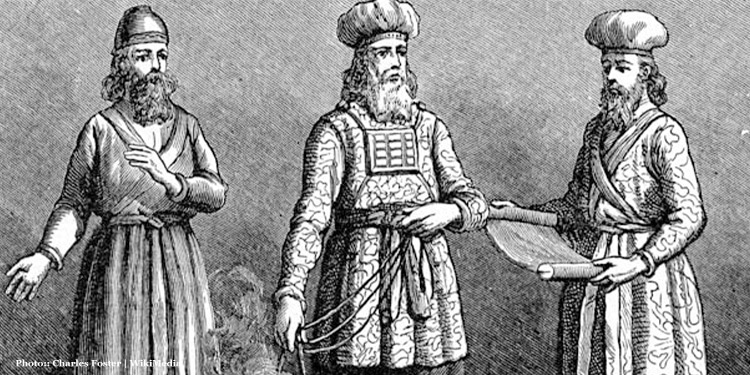
The Levites’ responsibilities were central to the spiritual life of Israel. They were in charge of the Tabernacle, and later the Temple in Jerusalem, overseeing the rituals and sacrifices that were integral to Israelite worship. The Levitical priesthood, descended from Aaron, Moses’ brother, played a pivotal role in maintaining the religious practices and laws of the community.
Moreover, the Levites were also teachers and keepers of the law, entrusted with educating the people in the ways of the Torah. Their role as religious educators and moral guides was crucial in preserving and transmitting the traditions and laws of Israel from generation to generation.
What Are the Lost Tribes of Israel?
Today, ten of those 12 tribes are considered to be the Lost Tribes of Israel. How is it possible to lose entire groups of people? To answer that question, we need to have a brief history lesson. Following the death of King Solomon, the nation of Israel split into two kingdoms—the northern kingdom, called Israel; and the southern kingdom, known as Judah. The tribes of Reuben, Simon, Dan, Naphtali, Gad, Asher, Issachar, Zebulun, Ephraim, and half the tribe of Manasseh made up the northern kingdom. Benjamin and Judah made up the southern kingdom.
The 10 Lost Tribes of Israel
- Reuben
- Simon
- Dan
- Naphtali
- Gad
- Asher
- Issachar
- Zebulun
- Ephraim
- Manasseh
In 722 B.C.E., the kingdom of Israel fell to the Assyrians, and according to Scripture, many of the Israelites were deported and scattered in foreign lands: “In the ninth year of Hoshea, the king of Assyria captured Samaria and deported the Israelites to Assyria. He settled them in Halah, in Gozan on the Habor River and in the towns of the Medes” (2 Kings 17:6). Unfortunately, those from the northern tribes have not been heard from since.
Where Are the Lost Tribes of Israel Today?
Theories abound as to the location of the “lost” ten tribes. According to the Encyclopedia of Judaism, a wide range of non-Jewish tribes and groups claim descent from the Israelites, such as sections of the Nigerian Yoruba tribe in Africa. Groups in Afghanistan and Pakistan have sub-tribal names such as Reubeni (Reuben), Efridar (Ephraim), and Ashuri (Asher), suggesting that they come from the biblical lost tribes of Israel.
The Jewish historian Favlius Josephus (37-100 CE) wrote in his book Antiquities of the Jews, “There are but two tribes in Asia and Europe subject to the Romans, while the ten tribes are beyond the Euphrates till now, and are an immense multitude, and not to be estimated by numbers.”
Stories of the recent discovery and return to Israel of the Bnei Menashe—the Jews living in India—and the Jews of Cush, or Ethiopia, support the idea that Jewish exiles to the north migrated to the “four quarters of the earth” (Isaiah 11:12), just as the Bible prophesied. And as Scripture also foretells, God “will reach out his hand a second time to reclaim the surviving remnant of his people” (v. 11).
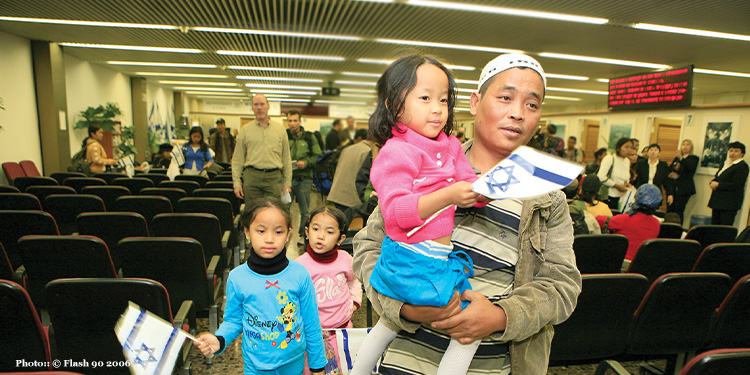
Bnei Menashe: The Children of Manasseh
Today, a tribe called Bnei Menashe (Hebrew for “Children of Manasseh) lives in the northeastern part of India. Believed to be the descendants of the Tribe of Manasseh, they began making aliyah (immigrating) to Israel 15 years ago, with The Fellowship helping this lost tribe return to their biblical and historic homeland.
Beta Israel: Ethiopian Jews
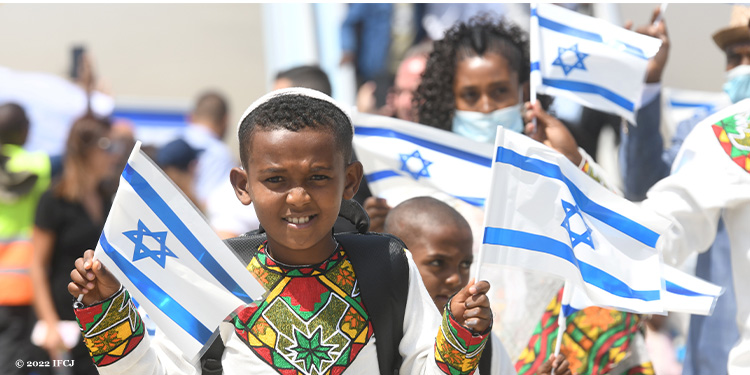
Ethiopian Jews known as Beta Israel are one of the oldest Jewish communities in the Diaspora. Yet, for hundreds of years there was little to no knowledge that there were Jews in Ethiopia. The world quickly turned its attention to Beta Israel when famine broke out in North Africa in the 1980s, pushing these Jews to seek asylum. As a result, Ethiopian Jews left Sudanese refugee camps and made aliyah to Israel in a series of covert missions now known as Operation Moses.
Ethiopian Jews and many others believe that Beta Israel are descended from the Tribe of Dan. This theory was also believed by famed ninth-century traveler and philologist, Eldad ha-Dani, who believed the Tribe of Dan decided to leave Israel when the Kingdom of David split and went to the land of Cush. In Isaiah 18, it is also prophesied that Jews would move to and live in the land of Cush, which is present-day Ethiopia.
Biblical Prophecy: Jews Returning to Israel
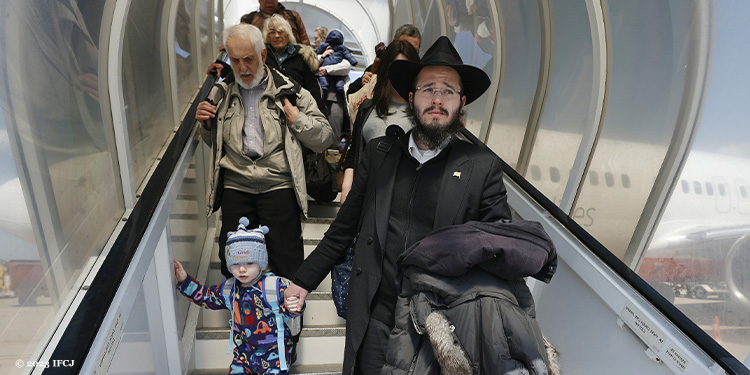
Jews from the former Soviet Union, Africa, India, South America, and elsewhere around the globe are returning to Israel — some returning with help from the generous donations of Christians through The Fellowship’s On Wings of Eagles ministry. God is bringing back His people to their homeland.
As we witness biblical prophecy being fulfilled and see firsthand God’s mighty work in and through His people, we can be encouraged that the Holy One we worship is faithful to all His promises. We can look forward to the day when, according to Zechariah 8:13, Judah and Israel will no longer be a curse among the nations, but a symbol and “a blessing.”
Discover how you can help bring God’s children back to their biblical homeland through The Fellowship.
Help Bring Them Home
Answer God’s call and help Jews return to the Holy Land with The Fellowship.
